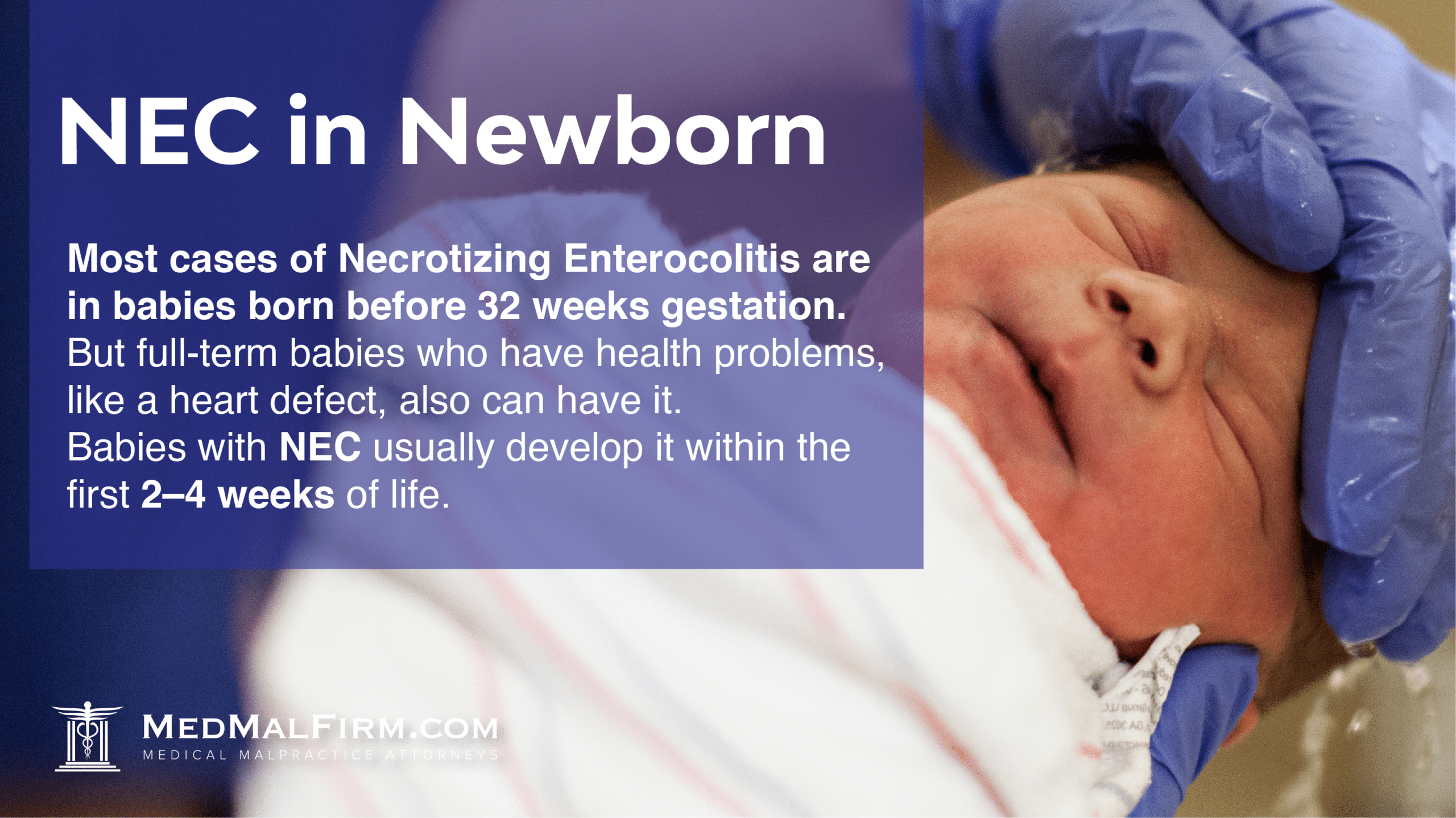
NEC in Newborns
Necrotizing enterocolitis, or NEC, is one of the most common intestinal diseases affecting newborns. NEC in newborns generally develops during between the second and third week of life. It is more common in premature infants,…
Necrotizing enterocolitis, or NEC, is one of the most common intestinal diseases affecting newborns. NEC in newborns generally develops during between the second and third week of life. It is more common in premature infants, but can develop among full-term infants as well.
NEC is characterized by infection or inflammation of the intestinal tract. The soft tissue inside the intestines becomes damaged or begins to die (necrosis). In some cases, tissue damage or death is extensive enough to cause a bowel perforation. When that happens, intestinal fluids and waste leak out into the abdominal cavity and into the bloodstream.
Sadly, around 50% of NEC cases result in death. Of newborns that do survive, there are a variety of complications and long-term impacts that can affect their lives.

Understanding NEC in Newborns
NEC most commonly develops in infants who are born prematurely, or those with low birth weight. It is important to understand that there are varying degrees of prematurity, and the more premature the newborn is, the more vulnerable he or she is. Medical standards consider newborns premature based on the following:
- Late Preterm: Born between 34 and 36 weeks gestation
- Moderately Preterm: Born between 32 and 34 weeks gestation
- Very Preterm: Born at 32 weeks gestation or earlier
- Extremely Preterm: Born 25 weeks gestation or earlier
The earlier a baby is born, the greater the risk of complications and medical problems. Premature newborns do not have mature bodily functions and systems like full-term babies. As a result, even a minor complication can cause serious injuries.
Birth weight is also a risk factor for NEC. Infants who are premature certainly have low birth weight, but even full-term newborns can weigh less than is optimal. The average birth weight for newborns in the U.S. is 7.5 pounds. However, 5.5 to 10 pounds is considered in the normal range.
NEC most commonly develops in infants who weigh less than 1,500 grams, or 3.3 pounds. It occurs in around 10% of infants in this weight range.
Causes of NEC in Newborns
Researchers still don’t know exactly what causes NEC. What we do know from research, however, is that there are some factors that increase the risk that a newborn will develop NEC. The most alarming risk factor and potential cause of NEC is the use of cow’s milk-based formulas in neonatal intensive care units (NICUs).
Premature newborns are very vulnerable, as their immune system and other functions are not completely developed yet. When premature newborns are fed formula that is made from cow’s milk, their immature digestive systems can’t adequately break down and process the proteins. As a result, formula does not move through the intestine properly, which can cause bacteria to build up.
Bacteria buildup causes inflammation and infection, and can lead to NEC. Furthermore, inflammation and infection can cause bowel perforation, sepsis, and can even be fatal. There are numerous studies showing that prioritizing human milk is the best way to prevent NEC. Cow’s milk-based formulas just aren’t as safe and healthy for premature newborns.
Human milk contains important nutrients that help a premature newborn’s systems mature. Lactoferrin and immunoglobulins help mature the infant’s digestive system and promotes feeding tolerance. These nutrients also generally help protect the infant from inflammation and disease.
There are multiple studies and trials that show that show that, not only is human milk healthier, but infants who are fed exclusively human milk have a substantially lower risk of developing NEC.
Recognize the Symptoms of NEC and Get Help
Recognizing the symptoms of NEC in newborns is crucial. NEC should be diagnosed and treated as soon as possible to avoid potential complications like bowel perforation or sepsis. Parents, notify your child’s doctor if you notice symptoms, such as:
- Abdominal swelling
- Difficulty eating
- Blood in the infant’s bowel movements
- Constipation
- Lethargy
- Low body temperature
- Slow heart rate
- Breathing difficulties
If your newborn has a combination of these symptoms and was fed cow’s milk-based formula, your doctor should check for NEC right away. The symptoms of NEC generally develop within the first two to four weeks of life.
Preventing NEC
There are no guaranteed ways of preventing NEC. However, there are ways to reduce the risk. Feeding human milk is the best way to reduce the risk of NEC in newborns. Also, proper monitoring of feeding protocols and digestion are important in recognizing symptoms that there may be a problem.
For parents, the more information you have about NEC, the better equipped you are to make choices about what’s best for your baby. Furthermore, the more you know, the better the chances that you will notice symptoms and get help before it’s too late. Sadly, many newborns with NEC don’t survive their illness. But that doesn’t have to be the “norm”.
Sources:
